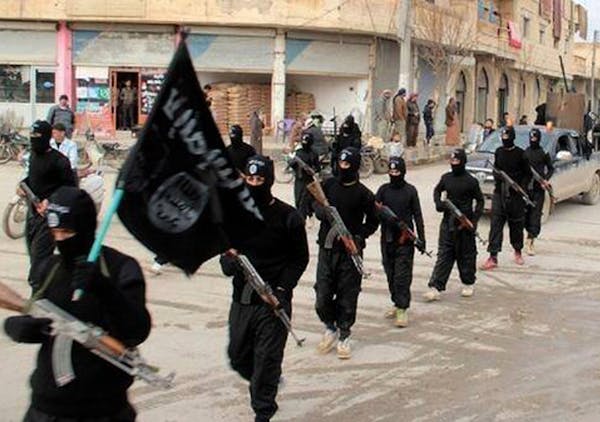From his shabby office in an old Minneapolis theater, Mohamed Farah plunges into a cyber war zone.
With just a few keystrokes, he's inside the online recruiting world of terrorists. He logs into the Facebook account of a local Somali teen and up pops the iconic black flag for ISIL, the fluttering symbol that beckons the undecided to join the cause. He scrolls down, reading the posts of a boy enamored of terrorists and the promise of martyrdom:
"This life is the sunset. It rises and it sets. Hope we reunite in paradise."
Farah exhales an audible sigh. "We've been trying to stop this thing since 2008, and we're not even close," he says.
Islamic State in Iraq and the Levant (ISIL) has zeroed in on Minnesota, home to the largest Somali population in the country, as a target-rich recruiting ground for fighters such as the boy on Facebook.
Federal investigators, as well as community leaders like Farah, say a sophisticated new wave of extremism is trying to sell disaffected youth on joining militant brigades in Syria and Iraq.
In recent months, about a dozen Minnesotans, mostly Somali-Americans, have slipped away to fight or aid known terrorist groups in Syria and Iraq. Federal authorities confirmed one Minnesota man died last month while fighting for ISIL. A second Minnesotan reportedly was killed in the same battle. Federal agents have intercepted young Somalis at the Minneapolis-St. Paul International Airport. At least three young women — including a 19-year-old from St. Paul — left the state three weeks ago and are believed to be in Syria.
As director of Ka Joog, a Somali youth outreach program, Farah is outmaneuvered, outspent and is quickly losing ground in the propaganda war being fought in cyber space.
ISIL's arsenal includes slick videos with soundtracks and English-speakers who call to their compatriots. "Those that are living in the U.S. — especially Minnesota — Great Britain, Germany and many parts of the kuffar [unbelievers'] world, you have a decision to make today," said a young man in a video released last month.
"This is what I'm up against," said Farah. "When it comes to marketing I've never seen anything like it. This is a whole different animal. The flag, military, guns — they know who they want to target."
And so, at last, does the U.S. Department of Justice.
In response to ISIL's campaign, the department is about to launch a counter-propaganda campaign in three U.S. metro areas — leading with the Twin Cities. This metro area was chosen first because federal authorities say it continues to be a prime recruiting ground for overseas terrorists.
The launch, planned for October, will specifically target the local Muslim community. U.S. Attorney Andy Luger said the campaign will offer quick-response videos to rebut ISIL, deeper community engagement with imams and social service groups, work with schools and mental health clinics, and more financial resources for organizations like Ka Joog.
"We need to reach the same kids that the foreign elements are reaching," Luger said in an interview.
"If you watch the recruitment videos, they are very clearly designed to resonate with disenfranchised young people," Luger said. "We need to counter those messages with a more compelling social media campaign."
'Let's Go for Jihad!'
For now, Ka Joog limps by on a $100,000 annual budget to serve about 2,500 youth. That breaks down to about 11 cents a day for each kid.
On the flip side, ISIL operates with tens of millions of dollars in revenue derived in part from black-market oil sales and secret funding. The group runs its own media arm, Al Hayat, churning out those high-end recruiting videos such as "Let's Go for Jihad!" with images of explosions and battles with AK-47s that resemble an X-Box video game. Tweets fly from the @ISIS_Media_Hub handle and are retweeted by thousands of other supporters praising ISIL.
Farah said the Obama administration must re-strategize how to fight these "cancerous ideologies" before more young Minnesotans die.
A former New Hope high school student — an African-American — and a Minneapolis man — a Somali — were reportedly killed last month in Syria while fighting for ISIL.
The two had been active on Twitter, using aliases. In the months before his death, Douglas McAuthur McCain retweeted many ISIL messages. His own tweets were laden with references to death.
"Ya Allah when it's my time to go have mercy on my soul have mercy on my bros," he wrote. In another tweet, he shared an image celebrating martyrdom with this caption: "Shuhada [martyrdom] in Jannah [paradise] with there [sic] souls in green birds. flying."
'It's a free-for-all'
McCain's tweets and the others backing ISIL offer real-time intelligence to FBI counterterrorism and cyber units.
For the FBI, those messages offer valuable insight into who may be moving toward radicalization — such as the Minneapolis boy whose Facebook page caught Farah's attention.
The FBI is confronting a propaganda behemoth that grows with every click. "It's a free-for-all," said FBI Agent E.K. Wilson, who has tracked the waves of Somali youth leaving Minnesota to fight overseas since the first ones headed for Somalia in 2007.
He says online recruitment aims to sell youth on achieving a romanticized purpose in life.
"This is an adventure and this is what you should be doing and you'll be a hero and eventually you'll be a martyr," Wilson said of the message.
But what motivates a Somali teenage boy in Minnesota to trade a relatively comfortable life for an unknown fate continues to baffle authorities.
"That's a question we've been asking for six years," Wilson said. "And that's a question that the vast majority of the Somali community — the leadership in that community — has been asking. Life is good here. And most of these kids don't realize what they have because they don't remember or they've never been there."
When Wilson first began investigating the recruitment of Minnesota Somalis by the Al-Qaida-linked group in Somalia — Al-Shabab — the main appeal was patriotism, defending the motherland from invading Ethiopia.
Today, the call to western youth to come fight in Syria and Iraq is based on religious duty; they're told they must come help establish an Islamic caliphate governed by a radical interpretation of Islamic law.
"It does raise it to a more mature and radical level," Wilson said.
What hasn't changed is who is vulnerable. What the recruits of 2007-08 and 2014 have in common is a missing father or strong male religious role model, Wilson said.
"It was the kind of similar vulnerabilities that we see in other areas that involve other kids being lured into other criminal activities — crimes against children, human trafficking, and gangs," he said.
Nadia Oweidat, a senior fellow at the New America Foundation in Washington, D.C., and an expert on radicalization of Muslim youth, agrees.
"You're more likely [to succumb to terrorism] if you feel alienated and your community is rejecting you," she said. "It's important to fight them at their own battle, at their own medium."
She praises a recent anti-ISIL video produced by the U.S. State Department that shows grisly images of ISIL's brutality, including crucifixions, executions and beatings. She says international Muslim leaders also need to create similar messages online to counter ISIL propaganda. "I believe we have a way better chance of winning that war than they do."
A Somali-American dream
Just blocks from the theater on Washington Avenue where Farah combats ISIL messages, Seleban Salah is sweating under a hard hat and sucking in dust as he directs large trucks into a construction site in the Cedar-Riverside neighborhood, the heart of Minnesota's Somali-American community.
The 28-year-old has a plan for his life — going back to the University of Minnesota to pursue a degree in construction management, and moving up the ranks in the company that took a chance on him a few years ago.
Salah is the kind of role model that Ka Joog and authorities are hoping will inspire other young Somali-Americans to reject radicalism and take their shot at the American dream.
He says a big reason for his success is the presence of a strong father figure, affirming the FBI's analysis. Salah's father holds two master's degrees and has worked for the federal government.
A graduate of St. Paul Central High, Salah fit in, playing middle linebacker on the football team. But one of his classmates had trouble finding his way. Farah Beledi didn't have a mother or father here. He lived with his grandmother, Salah said, and drifted into the street life. Defending his girlfriend, Beledi stabbed a man in the neck and went to prison. There, "he found religion," Salah said.
The next thing Salah heard was that his old classmate had been killed in Somalia — lured to fight for Al-Shabab.
News of a similar death hit him last month. A man he worked out with at a south Minneapolis YMCA was reportedly killed in Syria-Iraq — believed to be recruited by ISIL. Like his old high school friend, this man was struggling. The father of nine children, he reportedly had trouble supporting them. "A lot of kids, they don't have guidance and they can get influenced," Salah said.
Not so with Salah. He's too busy to listen to what ISIL has to say to him. And he's proud to be a role model.
"Right now, I'm getting $25 an hour," he said. "It's put me closer to the middle class and I can make a decent living. In 15 years, I can even be pulling down a pension."
paul.mcenroe@startribune.com • 612-673-1745 allie.shah@startribune.com • 612-673-4488

In Grand Rapids, Itasca Pride is planning its first event, but there is already pushback
One person shot at YMCA in Coon Rapids

BCA says man pointed pistol-style BB gun at officers before he was shot in Woodbury

Former diversity worker sues University of Minnesota after firing over swastika photo

